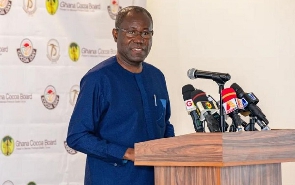Joseph Boahen Aidoo, the Chief Executive Officer of the Ghana Cocoa Board (COCOBOD), has dismissed claims of the existence of a Cocoa Fund, allegedly established by former President John Mahama during his presidency to serve as a pension scheme for cocoa farmers.
According to Mr. Aidoo, not only was this fund non-existent, but it also lacked any allocated funds.
The denial came in response to a statement made by Eric Opoku, the Member of Parliament for Asunafo South, during a cocoa farmers’ conference in the Ahafo Region.
Opoku asserted that the Mahama administration had set aside GHS28.9 million as seed money for the Cocoa Farmers’ Pension Scheme, a claim for which the current Akufo-Addo government is taking credit.
Mr. Opoku stated, “The Mahama administration left GHS28.9 million as seed money for a cocoa farmer pension scheme before leaving office, but the current administration has misappropriated the money and continues to claim to have introduced the scheme.”
Contrary to this assertion, Mr. Aidoo declared that there was no actual money in the Cocoa Farmers’ Pension Scheme.
He argued that while the amount was mentioned in a ledger, there were no real funds associated with it.
He challenged the opposition National Democratic Congress (NDC) to disclose the bank where the money had been deposited and the fund’s official name.
“There was no money in the Cocoa Farmers’ Pension Scheme as the NDC and former President Mahama claim”, the amount was only stated in a ledger, but there was no real money,” classfmonline.com quoted the CEO.
“How come no farmer was engaged or heard about it?” he wondered, and threw a challenge to the biggest opposition party thus: “I dare the NDC to come out and tell us which bank they deposited the money to and the name of the fund”.
Mr. Aidoo found it puzzling that the fund was mentioned in the Auditor-General’s report, given its non-existent nature.
 Kanawu Radio number 1 news portal
Kanawu Radio number 1 news portal

